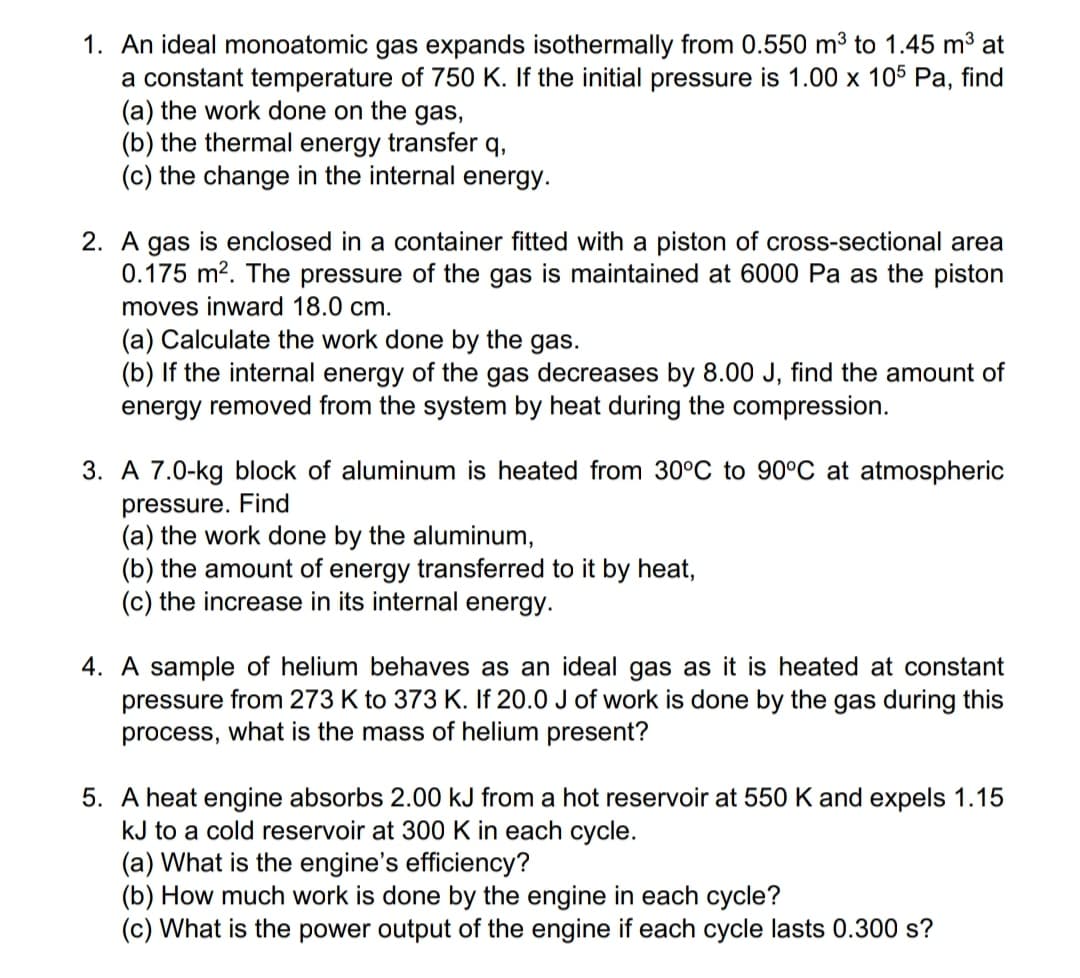5. A heat engine absorbs 2.00 kJ from a hot reservoir at 550 K and expels 1.15 kJ to a cold reservoir at 300 K in each cycle. (a) What is the engine's efficiency? (b) How much work is done by the engine in each cycle? (c) What is the power output of the engine if each cycle lasts 0.300 s?
5. A heat engine absorbs 2.00 kJ from a hot reservoir at 550 K and expels 1.15 kJ to a cold reservoir at 300 K in each cycle. (a) What is the engine's efficiency? (b) How much work is done by the engine in each cycle? (c) What is the power output of the engine if each cycle lasts 0.300 s?
Physics for Scientists and Engineers, Technology Update (No access codes included)
9th Edition
ISBN:9781305116399
Author:Raymond A. Serway, John W. Jewett
Publisher:Raymond A. Serway, John W. Jewett
Chapter21: The Kinetic Theory Of Gases
Section: Chapter Questions
Problem 21.51AP: A certain ideal gas has a molar specific heat of Cv = 72R. A 2.00-mol sample of the gas always...
Related questions
Question
Laws of Thermodynamics
PLS ANSWER NO.5

Transcribed Image Text:1. An ideal monoatomic gas expands isothermally from 0.550 m³ to 1.45 m3 at
a constant temperature of 750 K. If the initial pressure is 1.00 x 105 Pa, find
(a) the work done on the gas,
(b) the thermal energy transfer q,
(c) the change in the internal energy.
2. A gas is enclosed in a container fitted with a piston of cross-sectional area
0.175 m?. The pressure of the gas is maintained at 6000 Pa as the piston
moves inward 18.0 cm.
(a) Calculate the work done by the gas.
(b) If the internal energy of the gas decreases by 8.00 J, find the amount of
energy removed from the system by heat during the compression.
3. A 7.0-kg block of aluminum is heated from 30°C to 90°C at atmospheric
pressure. Find
(a) the work done by the aluminum,
(b) the amount of energy transferred to it by heat,
(c) the increase in its internal energy.
4. A sample of helium behaves as an ideal gas as it is heated at constant
pressure from 273 K to 373 K. If 20.0 J of work is done by the gas during this
process, what is the mass of helium present?
5. A heat engine absorbs 2.00 kJ from a hot reservoir at 550 K and expels 1.15
kJ to a cold reservoir at 300 K in each cycle.
(a) What is the engine's efficiency?
(b) How much work is done by the engine in each cycle?
(c) What is the power output of the engine if each cycle lasts 0.300 s?
Expert Solution
This question has been solved!
Explore an expertly crafted, step-by-step solution for a thorough understanding of key concepts.
This is a popular solution!
Trending now
This is a popular solution!
Step by step
Solved in 2 steps

Knowledge Booster
Learn more about
Need a deep-dive on the concept behind this application? Look no further. Learn more about this topic, physics and related others by exploring similar questions and additional content below.Recommended textbooks for you

Physics for Scientists and Engineers, Technology …
Physics
ISBN:
9781305116399
Author:
Raymond A. Serway, John W. Jewett
Publisher:
Cengage Learning

College Physics
Physics
ISBN:
9781305952300
Author:
Raymond A. Serway, Chris Vuille
Publisher:
Cengage Learning

Principles of Physics: A Calculus-Based Text
Physics
ISBN:
9781133104261
Author:
Raymond A. Serway, John W. Jewett
Publisher:
Cengage Learning

Physics for Scientists and Engineers, Technology …
Physics
ISBN:
9781305116399
Author:
Raymond A. Serway, John W. Jewett
Publisher:
Cengage Learning

College Physics
Physics
ISBN:
9781305952300
Author:
Raymond A. Serway, Chris Vuille
Publisher:
Cengage Learning

Principles of Physics: A Calculus-Based Text
Physics
ISBN:
9781133104261
Author:
Raymond A. Serway, John W. Jewett
Publisher:
Cengage Learning

Physics for Scientists and Engineers
Physics
ISBN:
9781337553278
Author:
Raymond A. Serway, John W. Jewett
Publisher:
Cengage Learning

Physics for Scientists and Engineers with Modern …
Physics
ISBN:
9781337553292
Author:
Raymond A. Serway, John W. Jewett
Publisher:
Cengage Learning

College Physics
Physics
ISBN:
9781285737027
Author:
Raymond A. Serway, Chris Vuille
Publisher:
Cengage Learning